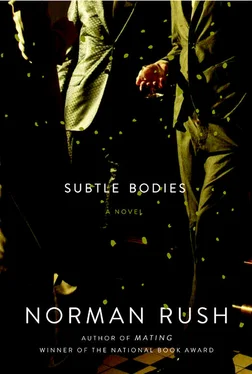Elliot intervened. He said, “Iva will talk individually later to you, one at a time, later. In the sun room.”
“What sun room?” Ned asked Gruen in a whisper.
“I’ll show you,” Gruen said.
But Iva wanted to say more. She said, “You, you were his true friends. I won’t stop now, Elliot. And you were more his friend than I was, you men, I have to say. I have to say that, yes.” She began wringing her hands. Elliot was walking distractedly around the table, driving his hands deep into his pants pockets. He appeared to be talking to himself.
Iva said, “We must make a … book .” She was imploring them.
Elliot said, “Well she doesn’t mean a book per se, she means a memorial collection … statements …”
“Yes, but in a book ,” Iva said.
Elliot said, “She means she wants it bound . That’s what she means.”
“Eulogies?” Joris asked.
Iva said, “Yes, but more . We must say them, and it must be the truth, you see.”
Gruen said, “I think she means a ceremony.”
Joris was saying something calming to her, and it seemed to be helping. Iva rose and the guests followed suit. The breakfast had been very truncated.
Now Elliot was saying that individual meetings with Iva would start in half an hour. Ned joined Iva and took her hand. He said, “Why don’t you take me second or third so I can take care of something first.”
“What is it?” she asked.
“Nothing, just something I need at the Vale. The Times .”
Iva covered his hand with hers and squeezed with a certain ferocity. She said, “You can go. You can go if you have to. But just be sure you don’t take the top paper on the pile he has, but take the next under. You see they let their filthy dog sleep on the papers.”
Elliot said, “Man there is no problem. We’re getting the Times delivered here starting today. Washington Post , too. And one last thing, you’re all coming out of the tower and over here.”
Introductions to the strangers, most of whom were from Deutsche Welle , were managed by Elliot. Ned knew that he wasn’t going to remember the names. They all looked young to him.
Elliot was leading Ned to his meeting with Iva when something disconcerting happened. In a recess in the living room wall between the end of the interminable sofa and a door to somewhere else in the Winchester Mystery House that this was, hung a framed full-length portrait of Iva and Douglas in late youth, in oil. Elliot veered off toward it and seemed to be brushing its surface smartly with his open hand. But that wasn’t what he was doing: he was flicking away a pushpin that someone had stuck into it. There was a lamp fixture on the top of the frame. Ned halted in front of the painting. He fiddled with the fixture but the bulb seemed to be dead.
Anyway, there he was, Douglas. There seemed to be lots of punctures in the surface. Who would have done that? Elliot was pulling at him. Recently Nina had said, Know what I hate?… puncture wounds.
Elliot said to come on. “Who did this?” Ned asked. Elliot was impatient and pulled at him.
Douglas’s ludic period had extended well beyond NYU. The double portrait, done in a photorealist mode by some artist whose name he should doubtless know, was a goof. There he was, Douglas, in safari kit, shirt and shorts and boots and thick socks up to the knee, standing unnaturally straight, separate from and not touching his wife, a miniature umbrella of the kind they put in mai tais held between the thumb and forefinger of his languidly dangling left hand. In back of the couple it was sea and cumulus. Iva was wearing sunglasses. Light blond, he would say her hair was then, and it was swept up and fixed in a sort of fan. She was wearing a black caftan with fragments of mirror sewn into it. And there were images of interest showing in the fragments if you had the time to look. He identified Mick Jagger in one of them, and, surprisingly to Ned, he saw an image of Claire. Douglas was his thin, willowy, standardly handsome second-lead self. His hair was combed straight back, flat against his head, and glistened with something like pomade. The artist had caught the quality of latent surprise that was always resident in Douglas’s main expression, had always been there. Nobody was smiling. Ned thought, Fahn fahn fahn on the autobahn. And the name for Iva’s sunglasses was harlequin. Nina would be interested in the details.
He and Elliot moved on.
It was nice, this new room. The main vista was of a wooded gorge. Iva had her back to it. She was seated in a voluminous rattan armchair and pointing to its twin, which was set close to hers, at an angle and at a fairly intimate distance, in his opinion. She had a stack of papers in her lap. There were more papers in an accordion file between her bare feet. Iva’s all-black outfit was, he thought, a little shiny for the circumstances. Maybe it was satin. She was wearing silver bracelets.
Elliot was in a corner using his cell phone. Ned had gotten a look at what Elliot was calling “the hub,” a room loaded with telephones, fax machines, and computers. He waved to Ned and left them, still engaged in his phone work.
“Have you a cigarette?” she asked Ned, in a hushed voice.
“Hey I’m sorry. I don’t smoke. Due to Douglas, by the way.” It was something he was grateful for, genuinely.
“I don’t either,” she said, holding a hand up and making a wiping motion. “No it’s just now. A little. You understand.”
Everybody around them had smoked in the seventies, at college. Against Sameness! could have been their group’s motto. And probably that sentiment as much as Douglas’s idiosyncratic interest in alternative medical notions had been behind the pressure to get them all to quit. Plainly Elliot had relapsed. One of Douglas’s more convincing faxes explained the handful of almonds Ned tried to remember to eat each day.
Ned said, “There’s lung cancer on both sides of my family. It was a gift, when I quit. I was smoking Kools at the time and Douglas had a medical photograph of the lungs of a menthol cigarette smoker, and that worked for me.”
“I like Marlboros,” she said. He could barely hear her.
Mist had flowed into the gorge and stalled there. It was beautiful. He said, “How are you doing? That’s an inevitable question and I know the answer. I’m sorry I even asked. You know how we all feel, Iva …”
She had lifted her chin up and tilted her head back. He felt the gesture showed her trying to keep the tears in. He didn’t know what to say. He noticed that she had a fine, straight, short, horizontal dent in the upper round of her cheeks. He’d seen that in some famous face, Russian, pre-war cinema. He couldn’t think of the star’s name.
Ned said, “I went to the ravine.” She flinched. He shouldn’t have said that. It was almost as stupid as Gruen having mentioned at breakfast his recollection that Douglas’s favorite Poe story was “The Premature Burial.”
One of the kitchen women came in, exchanged signs with Iva, and left.
“She will bring coffee,” Iva said.
A big trope with Douglas had been knowing the names, and as much as seemed appropriate and practical about the servers and helpers and cleaners, the security guards, all the support workers who kept life so pleasant for the student body at NYU. He had been kind of ostentatious about it, but over time it had seemed like the right thing to do, and the working rabble, as Douglas had referred to them, seemed to appreciate it. Ned had carried this practice on in a dilute way in his life and Nina just did it by reflex. Of course Douglas had hated some of the rabble, like Pugnacio, as Douglas called Ignacio, their irascible super in the building on Second Avenue.
Читать дальше











